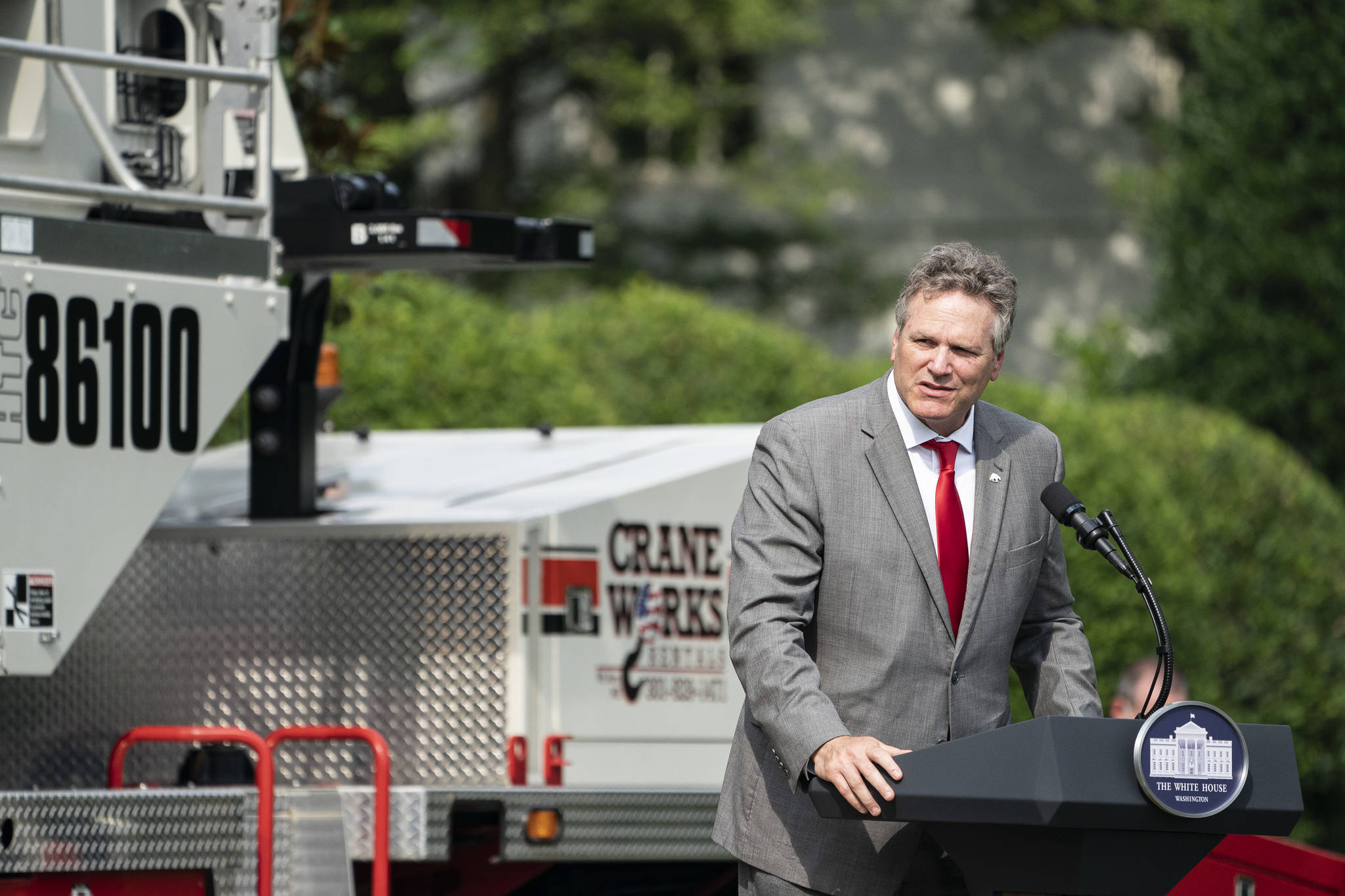Gov. Mike Dunleavy praised President Donald Trump’s changes to a long-standing federal environmental law during a speech at the White House.
Speaking Thursday before two construction cranes arranged on the White House lawn, Dunleavy told the president that the changes to the National Environmental Policy Act restore hope for the American Dream.
“Regulations over the past 40 years have really killed the American dream, as you said, Mr. President, strangled the American dream,” Dunleavy said. “We look at our resource development, we look at businesses, small and big and you’ve renewed hope that it is possible to achieve the American Dream.”
Dunleavy was one of two governors to speak at the White House event following remarks by Trump and Vice President Mike Pence.
Reading from prepared remarks, Trump characterized regulations as an assault on the American worker.
[Trump reins in major environmental law to speed big projects.]
“We’re here today to celebrate and expand our historic campaign to rescue American workers from job-killing regulations,” Trump said. “These oppressive, burdensome mandates were a stealth tax on our people — slashing take-home pay, suppressing innovation, surging the cost of goods, and shipping millions of American jobs overseas — millions and millions and millions. It never ended.”
The regulatory rollback would spur the construction of infrastructure, Trump said, by cutting the permitting timeline down to a maximum of two years. The focus on infrastructure was shared by Dunleavy, when he spoke to reporters at the White House.
“There’s no doubt that we want to protect the environment, Alaska protects its environment better probably than any other place on the planet,” Dunleavy said. “(This) will allow municipalities to expedite, in a positive way, sewer and water projects, or road projects, airport projects, port projects. It’s going to put our people to work, it’s going to give us the infrastructure that we need and it’s going to build a future for our future generations.”
But critics are worried the rollback will allow large companies to pollute the nation’s air and water without consequence. Brett Hartl, government affairs director at environmental group the Center for Biological Diversity, told the Associated Press “this may be the single biggest giveaway to polluters in the past 40 years.”
Local conservationists also reacted strongly, saying Alaskans would suffer under the rollback. In a statement, the Southeast Alaska Conservation Council, which said NEPA was the only place where the right to comment on and participate in development projects, was enshrined in law.
[Pebble Mine opponents say new federal change favors project]
In an interview Thursday, SEACC Executive Director Meredith Trainor said the jobs Dunleavy is trying to bring to Alaska weren’t the kinds of jobs Alaskans wanted.
“Those are jobs that are pushed by a few outside voices,” Trainor said, referring to resource industry jobs like timber and mining. “As we protect (Alaska’s environment) there are jobs created as well; tourism jobs, fishing jobs, habitat restoration jobs. Those are the jobs that will move Alaska forward.
Both Trump and Dunleavy talked of the rollback in terms of freeing the individual from the bureaucratic hand of the government.
“What you’ve done is,” Dunleavy said, speaking to Trump, “when the landowner goes and decides that they want to do a little landscaping on their property, do they have to look over their shoulder and wonder if big government is watching them? Can they do what they need to do on their private property? You’ve restored the hope that they can. That they can realize the American Dream.
Trainor cast doubt on Dunleavy’s comments about the rollback protecting individuals from the government.
“I don’t think anyone in Alaska buys that the NEPA rollback is about landscaping,” she said.
Speaking to reporters, Dunleavy said environmental regulations were necessary but that over the past 40 years regulations had become too burdensome and the rollback would “bring the pendulum back towards the middle.”
“We should scrutinize all of our projects to make sure that they pass muster to make sure they’re going to be safe for people, safe for the environment,” Dunleavy said. “But at the same time, we should have never used this process to slow down the ability to create wealth, create jobs. We should have never used this process to slow down infrastructure projects that are vital for America and for Alaska.”
In his speech at the White House, Dunleavy repeatedly thanked Trump for the rollback.
Dunleavy said because of Trump’s changes “(Alaskans) can realize the American Dream. And this goes for our corporations; this goes for our nonprofit entities; this goes for our Native corporations in Alaska. What you’ve done is restore hope and opportunity, and we’re looking forward to more years of this opportunity, Mr. President.”
• Contact reporter Peter Segall at psegall@juneauempire.com. Follow him on Twitter at @SegallJnoEmpire.

